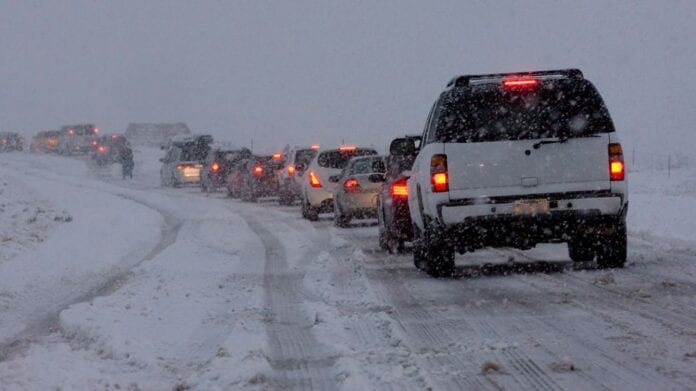Winter Watch Outs! Half of motorists ignore weather warnings despite the dangers
– Data reveals more severe road accidents happen in winter-
- Insurer sees 25% spike in car accident claims in November
- Highest percentage of severe accidents take place between November and February
- Almost a quarter of Brits (23%) say they have been involved in a car accident after driving in harsh winter weather conditions
- 21% of motorists would still risk driving if a severe flood warning had been issued
- Just one in four motorists would know what to do if their car hit black ice
- One in ten drivers are more nervous about driving in the dark since lockdown
A new investigation by Admiral Car Insurance has revealed how many motorists are unprepared for driving in winter weather and ignore weather warnings despite the increased risk of an accident during winter.
The months of November, December and January see the highest volume of car insurance claims over the year according to Admiral, as it warns the changing weather and road conditions most common during the winter months can bring some of the most difficult situations for motorists to navigate.
Analysis of Admiral claims data over the last five years reveals that on average, there is a 25% increase in the number of car insurance claims made in November compared with April, which sees the lowest number of accident claims on average.
But Admiral is warning that not only are motorists having more accidents during the winter months, these accidents are potentially more severe in nature.
According to Admiral data, the highest percentage of severe incidents take place during the winter months, with 12% in February, 11% in January and December, and 10% of claims in November being classified as severe.
Severe incidents relate to those where the vehicle is so badly damaged it’s undrivable, and potentially where someone is injured.
Car accidents during winter
As part of the investigation, Admiral surveyed 2,000 motorists in the UK and found almost a quarter of Brits (23%) have been involved in a car accident after driving in severe winter weather conditions, including snow, black ice, fog, flood water, thunderstorms and heavy rain, and high winds.
The results also found that one in ten (10%) motorists said they have been involved in a car accident caused by black ice on the roads, and as temperatures drop below zero in the winter months, Admiral is warning drivers there’s an increased chance that black ice will form on the roads putting motorists in danger.
Only a quarter (27%) of people said they felt confident and would know what to do if their car hit black ice, and 16% of people said they wouldn’t know what to do if they found themselves in this situation.
Road Safety expert with 20 years’ experience, Dave Harford says: “Driving on ice is difficult and demands time and care from drivers. The most important thing is not to rush.
“You cannot always see black ice and it can form anywhere, but it’s even more likely to form in tunnels bridges and on shaded quieter roads or low-lying areas where the early morning sun doesn’t get to.
“Vehicle stopping distances can be up to ten times longer on ice. So, plan ahead and perform smooth well-timed braking, acceleration, and steering. If you do find yourself skidding on ice do not panic, hold the wheel lightly, and ease off the throttle, do not brake.”
Ignoring weather warnings
According to the Met Office, a red weather warning means dangerous weather is expected and “it is very likely that there will be a risk to life” as well as advising people to avoid travelling, where possible, and follow the advice of the emergency services and local authorities.”1
Almost a fifth (18%) of drivers said they would risk driving despite a red weather warning being issued. Poor driving conditions caused by adverse weather includes reduced visibility, increased chance of skidding or aquaplaning and an increase in stopping distance.
Meanwhile, half (50%) of drivers on UK roads said they would ignore severe or normal flood warnings and continue to drive, despite a severe warning indicating a ‘danger to life’, the increased risk of a car accident and the potential impact on car insurance.
Admiral is warning motorists that driving through flood water could put them, and other road users, at risk as they’re more likely to lose control of their vehicle. In addition, any damage caused to their vehicle may not be covered by their insurance.
Worryingly, 68% of motorists weren’t aware that driving through flood water could invalidate their insurance.
Road Safety expert, Dave Harford says: “Don’t ignore the weather warnings – they’re put in place in order to protect people.
“Yellow warnings are the more regular ones issued, whereas amber and red aren’t as common but are much more serious. Red means a danger to life. Weather warnings can be issued and removed quickly, a bit like the weather itself – dynamic and always changing. If an area you’re in or going to has a weather warning, consider the times, severity and if your journey is worth it.
“As a water Rescue Technician, I’ve worked in flood situations and also swam to recover cars from floods. My advice for anyone, is do not drive into or enter a flood.
“Moving water is highly dangerous. Just six inches of fast flowing water will sweep an adult off their feet, twelve inches will make a car float, and two feet of moving water will wash a car away. But it’s not just the water you need to watch out for, there many other dangers you cannot see under the surface. This could include raised manhole covers, washed away roads, and other debris which could hurt, trap, or cause you problems. It’s always better to turn around and find another route. Remember, you should never ignore or move a Road Closed sign as it is there to protect you and other road users.”
Diving confidence
Admiral’s investigation revealed one in ten (11%) drivers are now more nervous about driving in the dark as a result of driving less during lockdown.
Meanwhile, some motorists have pulled over and stopped their car while driving because of challenging winter weather conditions – over a fifth (22%) admitted they did this because of heavy snow and 30% said they stopped because of heavy rain.
Unprepared drivers at risk
Many motorists simply aren’t prepared for driving during the winter months, which could put them at greater risk, Admiral has found.
The insurer found almost a third of people (32%) don’t keep de-icer in their car during the winter, and 23% don’t have an ice scraper either. Worryingly, a quarter of motorists (24%) confess to driving without fully de-icing their windscreen first.
Admiral is reminding motorists that it is illegal to drive with any ice or snow on your windscreen that obstructs your windscreen as it breaks the Highway Code Rule 229, and drivers could potentially be fined for driving with an obstructed windscreen. Drivers could be fined up to £2,500, be banned from driving, and get 3 penalty points for driving a vehicle in a dangerous condition2.
Meanwhile more than two thirds (68%) of people don’t keep high visibility clothing in their car which could help keep them safe should they break down during the darker winter months, 72% of people don’t keep a shovel in the boot of their car during winter, and 55% don’t keep a blanket in their vehicle during the winter months – something which help to keep them warm in an emergency.
Just 34% of motorists carry jump leads in their vehicle, and only 17% carry an empty fuel can.
Road Safety expert, Dave Harford recommends carrying the following items:
- A warm coat or blanket
- A torch, either with spare batteries or a wind up type
- A shovel
- An ice scraper
- De-icer
- Mobile phone – fully charged or with a in car charger
- Some food or Drink
- Suitable footwear in case you need to walk
- Any essential medication if you regularly need it
- Your wallet
- A high-vis jacket
Winter driving myths de-bunked
Admiral has unpicked some common myths surrounding driving in winter conditions, to help dispel myths and keep road users safe this winter.
- Driving with snow on the roof
More than two fifths (44%) of people think driving with snow on the roof of your car is illegal, but this is not actually the case.
Admiral says while it is not illegal to drive with snow on your roof, it falls onto your windscreen or into the path of another driver, it could be considered breaking the law for driving without consideration, or using a motor vehicle in a dangerous condition.
- Driving wearing wellies
More than one in ten (14%) people think driving in wellies is against the law.
Admiral says while it is not illegal to drive while wearing wellies, it is heavily advised against doing so. The Highway Code forbids wearing any footwear that jeopardises foot movement and the ability to switch between the pedals.
- Using boiling water to remove ice from windscreen
Admiral says using boiling water to remove ice from the windscreen is very dangerous and can cause your windscreen to crack, potentially seriously. While 68% of drivers are aware of the risks of using boiling water to de-ice their car’s windscreen, 32% admitted they didn’t realise that could happen.
- Changing to winter tyres
Admiral says it’s entirely legal to change your tyres in winter to ‘winter tyres’ – tyres with better grip and made of a different rubber to stop them hardening in the cold. You don’t need to let your insurer know, as long no other aspect of the vehicle has changed. According to Admiral’s research, 10% of people thought they had to inform their insurer before changing their vehicle’s tyres for winter.
- Staying in your car if there’s lightning
In the UK, 60% of motorists think it’s safer to get out of the car than stay in it in a lightning storm.
Admiral says it is safer to stay in your car if there’s lightning, as long as it is not a soft-top convertible or fibre glass bodied vehicle. Occupants should take care not to touch any metal parts of the car and keep the windows closed at all times.
- Driving in fog
Admiral says it is not recommended to use the high beam function on your headlights when driving in heavy fog – the bright lights serve as a distraction and actually cause reduced visibility against the fog. Worryingly, Admiral research revealed 18% of drivers think you should use high-beam in foggy conditions.
- Idling your vehicle to heat it up before driving
Admiral warns that not only is idling your vehicle before driving it on a cold day not recommended, it can also be illegal – something 59% of motorists didn’t know. Your car only needs just over a minute to warm up before you start driving it, and leaving it to idle until it’s all warm inside can land you with a fine – if it’s on a public road, or could risk having it stolen
Lorna Connelly, Head of Claims at Admiral said: “Winter brings with it a range of unpredictable weather that could dramatically impact driving conditions and makes even the shortest of journeys dangerous. Our data shows that not only is there an increase in accidents taking place during the winter months owing to adverse weather conditions, but that the severity of accidents also increases.
“It’s important motorists are aware of the risks involved and follow safety advice when travelling in order to keep themselves, their passengers, and other road users safe, particularly in tricky conditions. As well as understanding what to do if they find themselves driving in poor conditions, there are also simple steps they can take to make sure they are prepared should the worst happen – including travelling with extra provisions during winter.”
Admiral has a useful guide to winter driving to help motorists prepare for driving in the most testing conditions: https://www.admiral.com/magazine/guides/motor/winter-driving-tips
Road Safety expert, Dave Harford, shares his top tips for driving in winter weather conditions:
Driving during heavy rain: “Your journey will be safer and easier if your car is ready for these conditions . Dipped headlights and wipers should be in good condition and used alongside demisters so your windscreen and rear view window is clear. If you find yourself driving in heavy rain, slow down and give yourself more distance between you and the vehicle in front as braking distances can greatly increase during a wet spell. Do not use cruise control during wet spells.”
Aquaplaning: “Good tyres will not only improve handling and braking performance but will also reduce the risk of aquaplaning; this is when the tyres cannot cut through the water and therefore lose contact with the road surface, causing loss of control momentarily. If you find yourself in an aquaplane situation, stay calm. Hold the steering wheel lightly, do not brake, ease off the accelerator until you feel your car return to normal.”
Driving in snow: “First things first, consider if your journey is essential, if it isn’t, don’t go. The key to driving in winter months is to perform slow and gentle manoeuvres. Reduce your speed and don’t be aggressive. Once you lose control on snow, you become a passenger.
“To be able to drive on a snowy surface, keep speeds and engine revs low, do not use first gear to move away, instead opt for a higher gear to move off. Using second or third gear will make a massive difference and reduce the chance of the drive wheels spinning and you getting stuck. You should also remember to increase the distance between you and the car in front of you as stopping distances for ice or snow can be up to ten times longer than usual.”
Help keep news FREE for our readers
Supporting your local community newspaper/online news outlet is crucial now more than ever. If you believe in independent journalism, then consider making a valuable contribution by making a one-time or monthly donation. We operate in rural areas where providing unbiased news can be challenging. Read More About Supporting The West Wales Chronicle



























